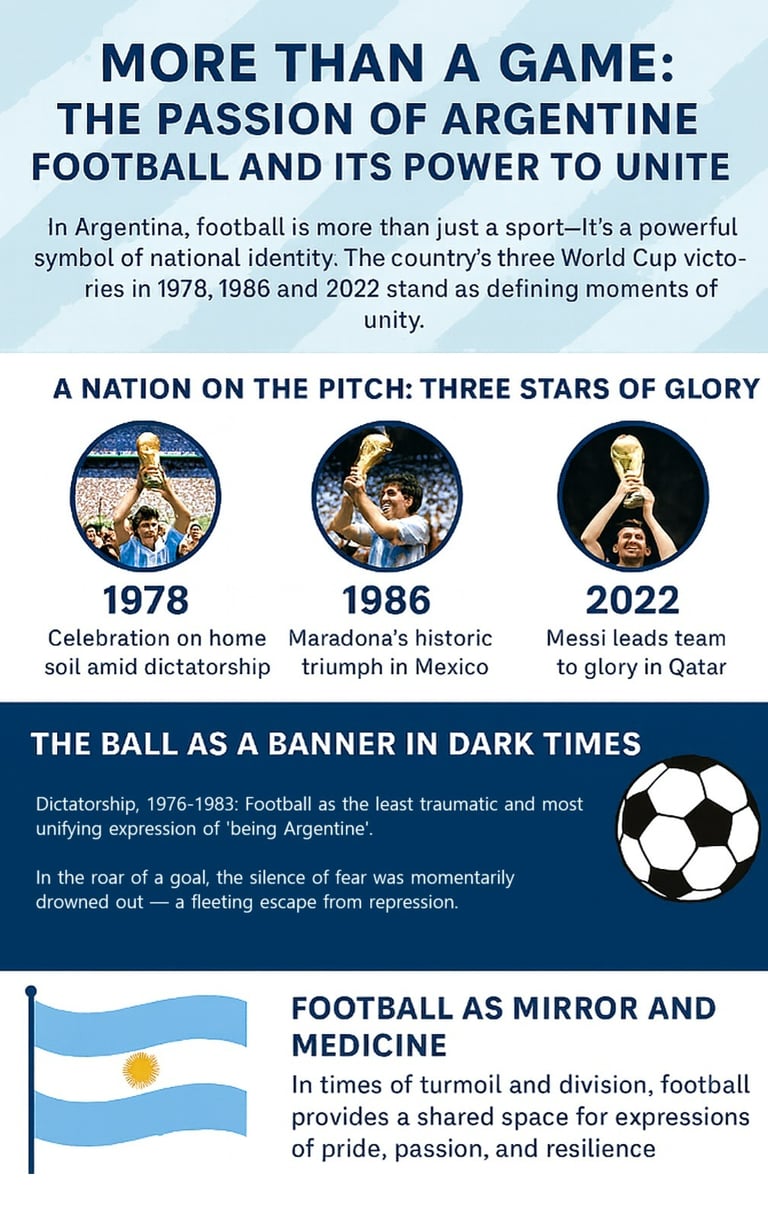Argentinian Football Passion, Explained: Glory, Identity, and the Power to Unite
Discover how Argentina’s football passion unites a divided nation—through dictatorship, glory, and three unforgettable World Cup triumphs.
TRADITIONSCULTUREARGENTINE FOOTBALL
Gabriela Arellano
8/1/20253 min read


In Argentina, fútbol is not just a sport—it’s a pulse. It beats through every barrio, echoes in stadium chants, and binds generations through shared moments of joy, pain, and fierce devotion. Football is perhaps the most enduring thread in the country’s emotional fabric. It transcends class, age, and ideology. And in moments of both triumph and turmoil, it has served as a powerful symbol of national identity—flawed, fragmented, and gloriously alive.
⚽ A Nation on the Pitch: Three Stars of Glory
Argentina’s love affair with the World Cup is immortalized in its three historic victories, each one reflecting a different moment in the country’s soul.
1978, on home soil, was more than a sporting triumph—it was a paradox. Celebrated in the midst of a brutal military dictatorship, the victory over the Netherlands gave the regime a tool for propaganda. Yet for the people, the joy of shouting “¡Argentina, campeón!” came from somewhere deeper. In the celebration of a goal, people momentarily reclaimed the idea of Argentina as something separate from its rulers—a feeling of pride that belonged to the people, not the regime.
1986 brought redemption, rebellion, and poetry. Led by Diego Maradona, Argentina lifted the cup in Mexico, defeating West Germany in a dramatic final. But it was the quarterfinal against England that burned itself into history. In the shadow of the Falklands War, Maradona delivered two unforgettable goals—first, the infamous Hand of God, a cunning act of provocation; and then, a solo masterpiece that danced past five defenders as if time itself had bent to his will. With the trophy raised high in the Azteca, Argentina didn’t just win a tournament—they reclaimed dignity, rewrote myth, and crowned a new national icon.
2022, with Lionel Messi at the helm, was a different kind of catharsis. After years of near-misses and heartbreaks, Argentina conquered the world once more—this time in Qatar, after a nerve-shattering final against France. The victory wasn’t just Messi’s coronation—it was a generational embrace. Young fans who had only heard of Maradona now had their own miracle to believe in. For a brief and beautiful moment, millions poured into the streets, weeping, laughing, singing—as if every corner of the country had remembered how to dream again.
🥅 Football as Mirror and Medicine
The Argentine passion for football is not a cliché. It is a national language, a theatre of emotions, a mirror that reflects who we are and how we long to be. It has mirrored our chaos and our resilience, our divisions and our dreams.
Argentina in the late 1970s and early 1980s was a country fractured by fear, censorship, and disappearance. The dictatorship that ruled from 1976 to 1983 waged a “Dirty War” against dissent, and in that climate of violence and silence, football became the only space where a shared emotion could survive.
For the military regime, the 1978 World Cup was a performance of order and patriotism. But for the people, it was a way to disconnect the meaning of Argentina from those in power, to feel unity not imposed by force, but born of shared ecstasy. The chants of Vamos, vamos, Argentina became a breath of fresh air in a suffocating time—a fragile thread of hope for families waiting for news of missing sons, daughters, and siblings. In a country gripped by silence, football gave voice to something that still felt alive.
The irony is profound—football was used by the dictatorship as a smokescreen, yet in the stands and in the streets, it became a whisper of resistance, a collective heartbeat reminding Argentines that the country still belonged to them.
The Ball as a Banner in Dark Times



When the country faces economic hardship, political upheaval, or cultural fragmentation, football remains a sanctuary. It is where we fight and debate fiercely—but also where we cry together. Where we remember that, despite everything, we are a people capable of dreaming—and of creating beauty out of struggle.
Whether in the villas of Buenos Aires, the hills of Salta, or the plains of Santa Fe, children still grow up with the same vision: scoring that goal in a World Cup final, wearing the sky-blue and white. Because in Argentina, football is not just a passion.
💙 It’s a way of surviving the darkness—and of finding light.
Explore more posts in our Argentine Culture & Traditions category
Know Argentina
Discover diverse insights about Argentina's rich culture.
Connect
stay in the loop
info@knowargentina.com
© 2025. All rights reserved.
